The SSD Relapse: Understanding and Choosing the Best SSD
by Anand Lal Shimpi on August 30, 2009 12:00 AM EST- Posted in
- Storage
What's Wrong with Samsung?
The largest SSD maker in the world is Samsung. Samsung makes the drives offered by Apple in its entire MacBook/MacBook Pro lineup. Samsung makes the drives you get if you order a Lenovo X300. In fact, if you're buying any major OEM system with an SSD in it, Samsung makes that drive.
It's just too bad that those drives aren’t very good.
This is the 4KB random write performance of Samsung's latest SSD, based on the RBB controller:
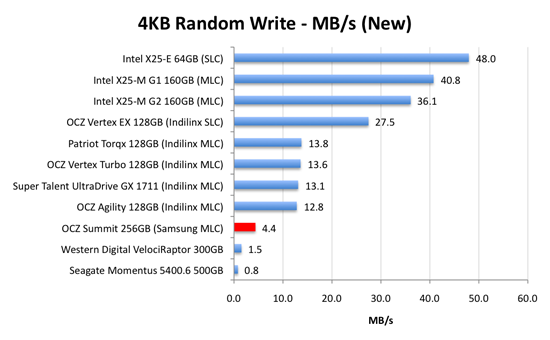
4.4MB/s. That's 3x the speed of a VelociRaptor, but 1/3 the speed of a cheaper Indilinx drive.
Speedy, but not earth shattering. Now let's look at performance once every LBA has been written to. This is the worst case scenario performance we've been testing for the past year:
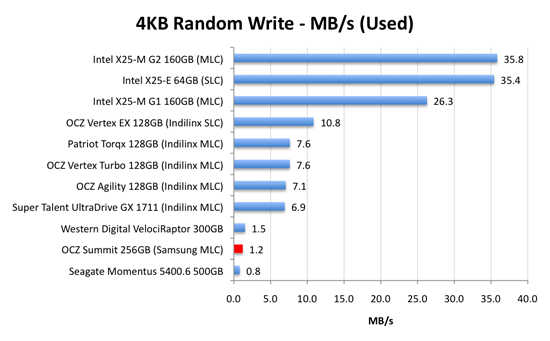
...and now we're down to mechanical hard drive speeds
Holycrapwtfbbq? Terrible.
Now to be fair to Samsung, this isn’t JMicron-terrible performance. It’s just not worth the money performance.
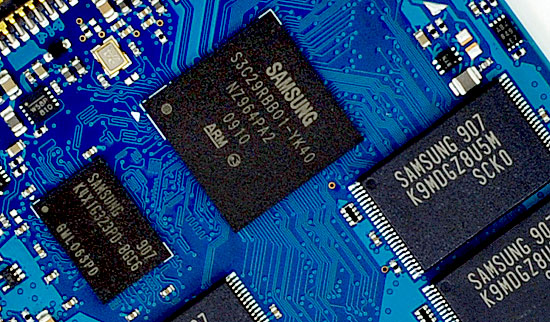
The Samsung RBB based SSDs are rebranded by at least two manufacturers: OCZ and Corsair.
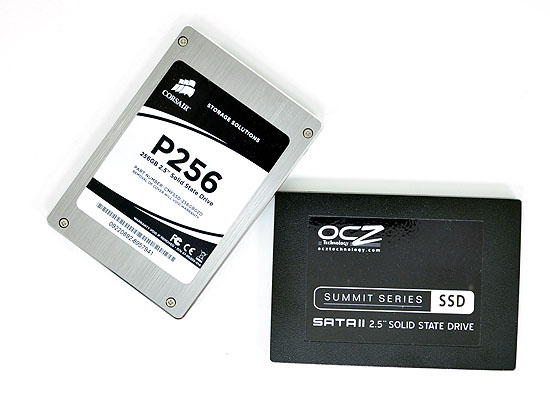
The OCZ Summit and the Corsair P256 both use the Samsung RBB platform.
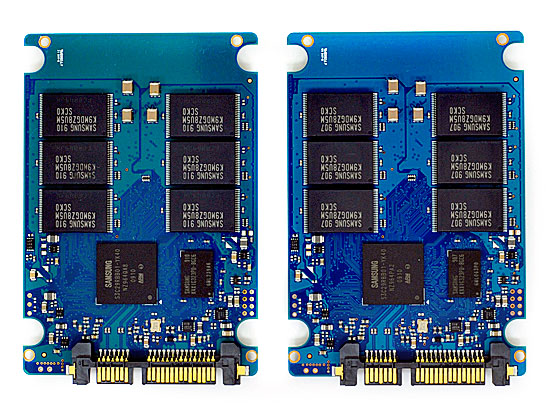
The Corsair and OCZ Samsung RBB drives.
The drive most OEMs are now shipping is an even older, lower performing Samsung SSD based on an older controller.
I talked to some of the vendors who ship Samsung RBB based SSDs and got some sales data. They simply can’t give these drives away. The Indilinx based drives outsell those based on the Samsung RBB controller by over 40:1. If end users are smart enough to choose Indilinx and Intel, why aren't companies like Apple and Lenovo?
Don't ever opt for the SSD upgrade from any of these OEMs if you've got the option of buying your own Indilinx or Intel drive and swapping it in there. If you don't know how, post in our forums; someone will help you out.
Samsung realized it had an issue with its used-state performance and was actually the first to introduce background garbage collection; official TRIM support will be coming later. Great right? Not exactly.
There’s currently no way for an end user to flash the firmware on any of these Samsung drives. To make matters worse, there’s no way for companies like OCZ or Corsair to upgrade the firmware on these drives either. If you want a new firmware on the drive, it has to go back to Samsung. I can’t even begin to point out how ridiculous this is.
If you’re lucky enough to get one of the Samsung drives with background garbage collection, then the performance drop I talked about above doesn’t really matter. How can you tell? Open up Device Manager, go to your SSD properties, then details, then select Hardware Ids from the dropdown. Your firmware version will be listed at the end of your hardware id string:
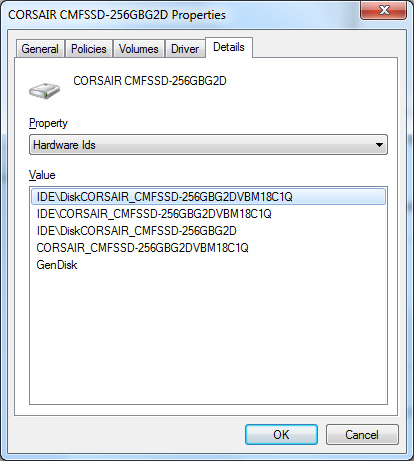
Version 1801Q doesn’t support BGC. Version 18C1Q (or later) does.
How can you ensure you get a model with the right firmware revision? Pick a religion and start praying, because that’s the best you can do.
Now the good news. When brand new, the Samsung drives actually boast competitive sequential write, sequential read and random write speeds.
These drives are also highly compatible and very well tested. For all of the major OEMs to use them they have to be. It’s their random write performance that’s most disappointing. TRIM support is coming later this year and it will help keep the drives performing fresh, but even then they are still slower than the Indilinx alternatives.
There’s no wiper tool and there’s currently no method to deploy end-user flashable firmware updates. Even with TRIM coming down the road, the Samsung drives just don’t make sense.










295 Comments
View All Comments
GourdFreeMan - Tuesday, September 1, 2009 - link
You would, in fact, be incorrect. I refer you to ANSI/IEEE Std 1084-1986, which defines kilo, mega, etc. as powers of two when used to refer to sizes of computer storage. It was common practice to use such definitons in Computer Science from the 1970s until standards were changed in 1991. As many people reading Anandtech received their formal education during this time period, it is understandable that the usage is still commonplace.Undersea - Monday, August 31, 2009 - link
Where was this article two weeks ago before I bought my OCZ summit? I hope this little article will jump start samsung.Thanks for all the hard work :)
FrancoisD - Monday, August 31, 2009 - link
Hi Anand,Great article, as always. I've been following your site since the beginning and it's still the best one out there today!
I mainly use Mac's these days and was wondering if you knew anything about Apple's plans for TRIM??
Thanks for all the fantastic work, very technical yet easy to understand.
François
Anand Lal Shimpi - Monday, August 31, 2009 - link
Thanks for your support over the years :)No word on Apple's plans for TRIM yet, I am digging though...
Take care,
Anand
Dynotaku - Monday, August 31, 2009 - link
Amazing article as always, now I just need one that shows me how to install just Win 7 and my Steam folder to the SSD and move Program Files and "My Documents" or whatever it's called in Win7 to a mechanical disk.GullLars - Monday, August 31, 2009 - link
A really great article with loads of data.I only have one complaint. The 4kb random read/write tests in IOmeter was done with QD=3, this simulates a really light workload, and does not allow the controllers to make use of the potential of all their flash channels. I've seen intels x25-M scale up to 130-140 MB/s of 4KB random read @ QD=64 (medium load) with AHCI activated. I have not yet tested my Vertex SSDs or Mtron Pro's, but i suspect they also scale well beyond QD=3.
It would also be usefull to compare the different tests in the HDDsuite in PCmark vantage instead of only the total score.
Anand Lal Shimpi - Monday, August 31, 2009 - link
The reason I chose a queue depth of 3 is because that's, on average, what I found when I tried heavily (but realistically) loading some Windows desktop machines. I rarely found a queue depth over 5. The super high QDs are great for enterprise workloads but I don't believe they do a good job at showcasing single user desktop/notebook performance.I agree about the individual HDD suite tests, I was just trying to cut down on the number of graphs everyone had to mow through :)
Take care,
Anand
heulenwolf - Monday, August 31, 2009 - link
Anand,I'd like to add my thanks to the many in the comments. Your articles really do stand out in their completeness and clarity. Well done.
I'm hoping you or someone else in the forums can shed some light on a problem I'm having. I got talked into getting a Dell "Ultraperformance" SSD for my new work system last year. Its a Samsung-branded SLC SSD 64 GB capacity. As your results predict, its really snappy when its first loaded and performance degrades after a few months with the drive ~3/4 full. One thing I haven't seen predicted, though, is that the drives have only lasted 6 months. The first system I received was so unstable without explanation that we convinced Dell to replace the entire machine. Since then, I'm now on my second SSD refurb replacement under warranty. In both SDD failures, the drive worked normally for ~6 months, then performance dropped to 5-10 MB/sec, Vista boot times went up to ~15 minutes, and I paid dearly in time for every single click and keypress. Once everything finally loaded, the system behaved almost normally. Dell's own diagnostics pointed to bad drives, yet, in each case, the bad SSD continued to work just at super slow speeds. I was careful to disable Vista's automatic defrag with every install.
My IT staff has blamestormed first Vista (we're still mostly an XP shop) and now SSDs in general as the culprit. They want me to turn in the SSD and replace it with a magnetic hard drive. So, my question is how to explain this:
A) Am I that 1 in a bazillion case of having gotten a bad system followed by a bad drive followed by another bad drive
B) Is there something about Vista - beyond auto defrag - that accelerates the wear and tear on these drives
C) Is there something about Samsung's early SSD controllers that drops them to a lower speed under certain conditions (e.g. poorly implemented SMART diagnostics)
D) Is my IT department right and all SSDs are evil ;)?
Ardax - Monday, August 31, 2009 - link
Well, first you could point them to this article to point out how bad the Samsung SSDs are. Replace it with an Intel or Indilinx-based drive and you should be fine. Anecdotes so far indicate that people have been beating on them for months.As far as configuring Vista for SSD usage, MS posted in the Engineering Windows 7 Blog about what they're doing for SSDs. [url=http://blogs.msdn.com/e7/archive/2009/05/05/suppor...">http://blogs.msdn.com/e7/archive/2009/0...nd-q-a-f...]Article Link[/url].
The short version of it is this: Disable Defrag, SuperFetch, ReadyBoost, and Application and Boot Prefetching. All these technologies were created to work around the low random read/write performance of traditional HDs and are unnecessary (or unhealthy, in the case of defrag) with SSDs.
heulenwolf - Monday, August 31, 2009 - link
Thanks for the reply, Ardax. Unfortunately, the choice of SSD brand was Dell's. As Anand points out, OEM sales is where Samsung's seems to have a corner on the market. The choices are: Samsung "Ultraperformance" SSD, Samsung not-so-ultraperformance SSD, Magnetic HDD, or void the warranty by getting installing a non-Dell part. I could ask that we buy a non-Dell SSD but since installing it would preclude further warranty support from Dell and all SSDs have become the scapegoat, I doubt my request would be accepted. Additionally, the article doesn't say much about drive reliability which is the fundamental problem in my case.I'll look into the linked recommendations on Win 7 and SSDs. I had already done some research on these features and found the general concensus to be that leaving any of them enabled (with the exception of defrag) should do no harm.